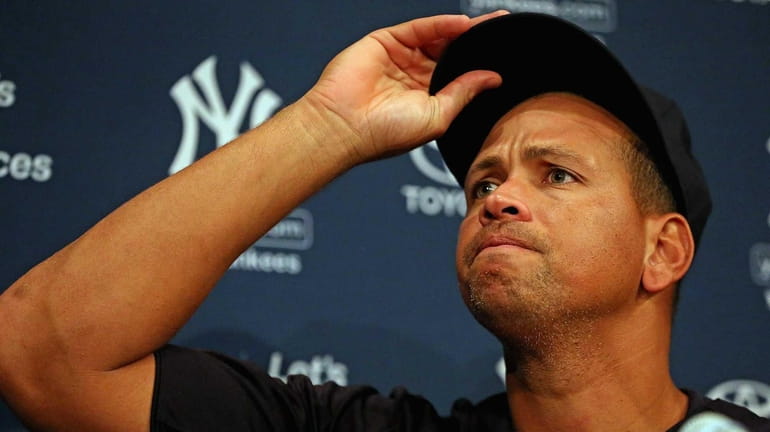Alex Rodriguez suspended through 2014 season by MLB

Alex Rodriguez speaks to the media before the Yankees take on the Chicago White Sox at U.S. Cellular Field. (Aug. 5, 2013) Credit: Getty Images
Major League Baseball suspended Alex Rodriguez Monday for 211 games, through the 2014 season, for taking performance-enhancing drugs and obstructing baseball's investigation, but the Yankees star vowed to battle the unprecedented ban, saying he is "fighting for my life."
Rodriguez, who has missed the first 110 games of the season after hip surgery, made his season debut Monday night for the Yankees in Chicago and could remain with the team while the suspension goes through the appeals process.
Rodriguez had one hit in four at bats Monday night, singling on a soft liner to left his first time up before flying out twice and striking out in his final at bat.
"The last seven months has been a nightmare," Rodriguez, 38, said before the game. "Probably the worst time of my life."
The third baseman has three days to appeal, which Rodriguez, his attorney and the Players Association said he would do. The 211 games are 49 games remaining this season after Thursday and the 162 games next year. If the suspension is upheld, Rodriguez could not play in the postseason. A 211-game suspension would cost Rodriguez roughly $34 million.
Thirteen players were suspended Monday as part of the league's investigation into Biogenesis, a now-shuttered anti-aging clinic in Miami that allegedly provided performance-enhancing drugs to players.
Of the 13, only Rodriguez elected to fight the decision. The other 12, which includes Yankees catcher Francisco Cervelli and Mets utility man Jordany Valdespin, accepted the punishment and began serving the suspensions immediately. Milwaukee star Ryan Braun had agreed to a 65-game suspension in July for his connection to Biogenesis.
Rodriguez's appeal will be heard by arbitrator Fredric Horowitz. A hearing could take up to 20 days to take place. After that, a decision could take 25 days to come down. It's possible the process could go on longer, possibly into November. In the meantime, Rodriguez can play and will continue to get paid.
Rodriguez, speaking at a news conference before the game, said he was "obviously disappointed with the news today, no question about it. But what we've always fought for was the process, and I think we have that. And at some point we'll sit in front of an arbiter and give our case. I'm fighting for my life, I have to defend myself. If I don't defend myself, no one else will."
Asked if he would deny MLB's charges of PED use, Rodriguez answered, "Like I said, I think we'll have a forum to discuss all of that and we'll talk about it then."
In 2009, two years after he signed a 10-year, $275-million contract with the Yankees -- the biggest in the history of sports -- Rodriguez admitted taking PEDs while playing for the Texas Rangers from 2001-03.
Rodriguez's attorney, David Cornwell, said MLB has gone "beyond the authority granted to its Joint Drug Agreement and the Basic Agreement. Consequently, we will appeal the discipline and pursue all legal remedies available to Alex."
Michael Weiner, executive director of the Players Association, called baseball's action "way too harsh, we've never had a 200-plus penalty for a player who may have used drugs. . . . I think that is way out of line."
The Yankees released a statement after the suspension that addressed Rodriguez's veiled comments on Friday that efforts were being made behind the scenes to void his contract. "The New York Yankees in no way instituted and/or assisted MLB in the direction of this investigation," the statement said, "or used the investigation as an attempt to avoid its responsibilities under a player contract; or did its medical staff fail to provide the appropriate standard of care to Alex Rodriguez."
Asked if he believes the Yankees want him back, Rodriguez responded, "If I'm productive, I think they want me back."
Baseball commissioner Bud Selig issued a statement, saying: "This case resoundingly illustrates that the strength of our Program is not limited only to testing. . . . We look forward to working with the players to make the penalties for violations of the Drug Program even more stringent and a stronger deterrent."
MLB and Rodriguez, sources said, were never close to making a deal even though Weiner said Selig was directly involved.
"As far as Bud Selig's involvement, it was my understanding that Bud Selig was involved the whole time," Weiner said. "This was a negotiation that Bud took a personal interest in and got personally involved."
Rodriguez's suspension is according to both baseball's Joint Drug Agreement and the Basic Agreement. Selig could have kept Rodriguez off the field by invoking the "best interests of baseball" clause, but it was rejected, a source said, to keep the focus on the issues relating to Rodriguez, not Selig.
"Rodriguez's discipline under the Joint Drug Prevention and Treatment Program is based on his use and possession of numerous forms of prohibited performance-enhancing substances, including Testosterone and Human Growth Hormone, over the course of multiple years," the MLB statement said. "Rodriguez's discipline under the Basic Agreement is for attempting to cover-up his violations of the Program by engaging in a course of conduct intended to obstruct and frustrate the Office of the Commissioner's investigation."
With David Lennon in Chicago
